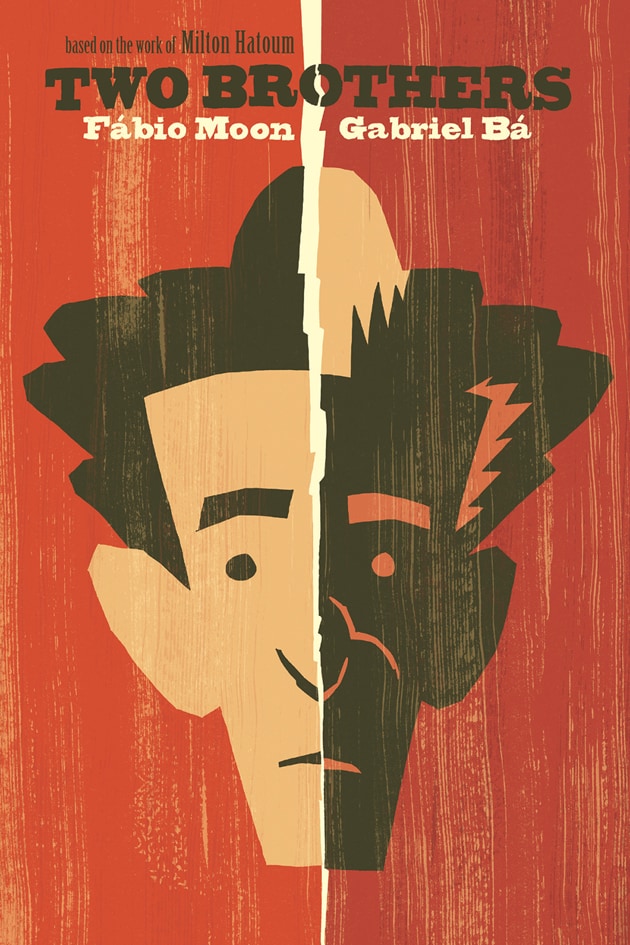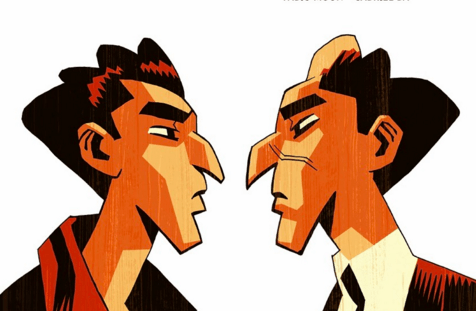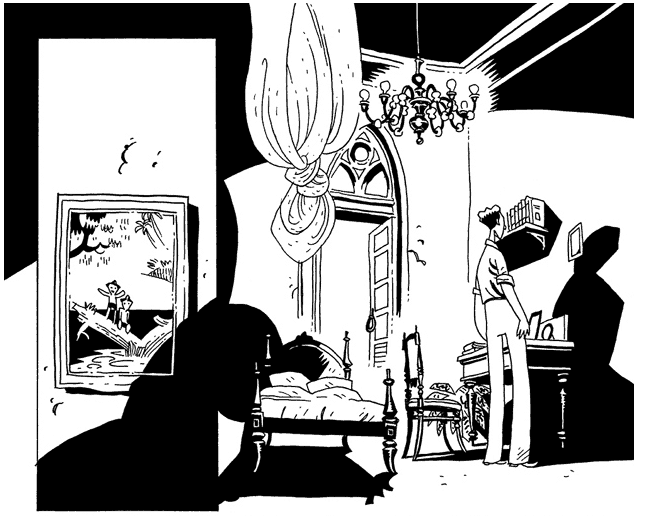
Written and drawn by Fábio Moon and Gabriel Bá
Published by Dark Horse Comics
“Everything improves after the end of a war.”
Based off of the novel The Brothers by Brazilian novelist Milton Hatoum, Two Brothers charts the post-WWII life of a family as a continuing war fought not with guns and grenades, but with words and betrayal. Sometimes, it is a hot war, but most of the time it is a cold war that stretches all the way to twin brothers Yaqub and Omar’s childhood. Although they are physically twins, the two boys are nothing alike. “The twins were opposites inhabiting the same body and sleeping under the same roof,” the narrator explains. Yaqub, the brother sent away to Lebanon for five years, is the brooding and serious one, returning home without ever knowing why his parents sent him to live with relatives half a world away. Omar is the lover, the momma’s boy, who breezes through life without ever accepting any responsibility. At a young age, a deep-seated conflict develops between the two brothers that ends up tearing through their family. The brothers’ constant conflict consumes their parents and their sisters as casualties of this war.
Gabriel Bá and Fábio Moon’s comics reminds you to live. That’s what their Vertigo comic Daytripper is all about: a memento mori erected against a life filled with many chances and many choices. Two Brothers takes us back to a South American setting as we see a family that’s only linked together through blood, not love. In the story of Yaqub and Omar, Bá and Moon, twin brothers themselves, explore a generation of a prosperous Brazilian family and the damages that can happen to that family in the span of a single lifetime. Beginning at the childhood of the twin boys, Bá and Moon trace the emotional damage that leaves a family devastated as the sins of the brothers are visited on their parents, their siblings and even on future generations.
Working together, Moon and Bá ’s black and white artwork feels so much more vibrant than a lot of their colored comics do. Casanova’s Cris Peter and Daytripper’s Dave Stewart give their comics depth and luminosity. Even in the old, old days of Casanova, when the book was only printed in a monochromatic scheme, that simple coloring created an emotional emphasis over their drawings. What they lose by abandoning color in Two Brothers, they gain in the richness of the space they create in their mark making. The cartooning on display here opens up a whole world for the characters and the readers. The Brazilian houses, the cities and the jungles, the vegetation of the forests, and the rich clothing that these characters wear help illustrate the intimacy and the gulfs that exist among this family.
Moon and Bá ’s artwork, with its attention to and occasional strategic lack of detail, is all about the emotion and the lifeforce that they instill in every line and brush mark. In their story, it’s not that one brother is the good one while the other is the bad one. No one in this familial war is completely guilty or completely innocent. The artwork makes it a black and white world, but it gives room for Moon and Bá to create to room for these characters to live and make mistakes in. Their drawings are as sensual and vivacious as their characters. Moon and Bá can be highly economical with their sparse drawing when they need to be, and then in the very next panel can be overwhelming in the details of these people’s lives. No panel or mark is wasted as every image shows what it needs to in order to create the soul of this comic.
That space and soul that they create gives their characters the room to age and to change. We get to see Yaqub and Omar as children and follow their lives through middle age. All of the members of this family get their story told, even if it’s just the sister who has to grow up and take care of their aged mother for the rest of her life. Bá and Moon’s characters get to be young and in love and then pages later, they get to be old and bitter as life has happened to these people. Yaqub’s father, shown as a young man at one point in the story, gets to say “A child is a killjoy” but this family patriarch then gets to spend his old age trying to be the father and grandfather that he should have been when it really mattered.
“Everything improves after the end of a war,” but what if there’s no end to war? Two Brothers begins in the days following World War II, but that’s really just the beginning of the emotional cold war that develops between Yaqub and Omar. Fábio Moon and Gabriel Bá tragic family saga is about people who should be bonded together by blood but have uncrossable gulfs between them that just spread and grow with every passing year. The space that the cartoonists unfold in this comic gives the readers the room to move around in and inhabit the same spaces occupied by Yaqub and Omar.
Rating: 9/10



